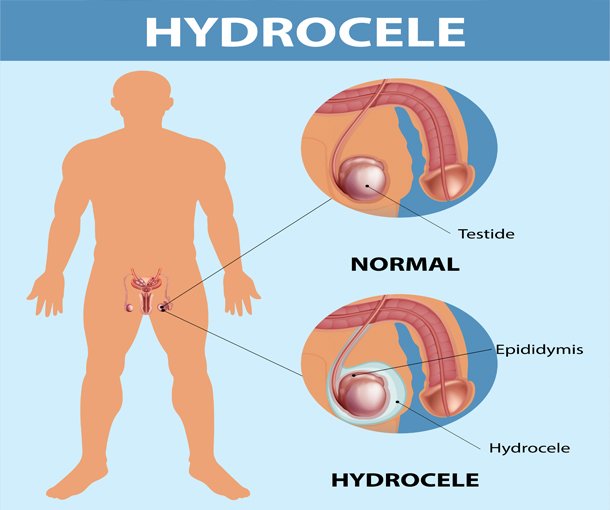A hydrocele is a fluid-filled sac that forms around one or both testicles, causing swelling in the scrotum. It is relatively common and often occurs in newborns but can also develop in adults.

Types of hydrocele include:
- Communicating Hydrocele: Occurs when fluid from the abdominal cavity flows into the scrotum through an opening in the inguinal canal. This type may fluctuate in size and is more common in infants.
- Non-Communicating Hydrocele: Results from fluid accumulation around the testicle without communication with the abdominal cavity. This type is typically seen in adults and usually does not fluctuate in size.
Symptoms of hydrocele can include:
- Swelling in one or both sides of the scrotum, which may increase over time
- A feeling of heaviness or discomfort in the scrotum
- Typically, hydroceles are not painful, but discomfort may occur due to pressure or size
Diagnosis involves:
- Physical Examination: A healthcare provider will assess the scrotum for swelling and may use a transillumination test to check if the swelling is fluid-filled.
- Ultrasound: Imaging to confirm the presence of fluid and to differentiate hydrocele from other scrotal conditions.
Homoeopathy Treatment
In homeopathy, treatment for hydrocele focuses on supporting the body’s natural healing processes . Remedies are selected based on individual symptoms, the underlying cause, and overall health.
Here are some homeopathic remedies that might be considered for hydrocele:
- Apis Mellifica: For hydrocele with swelling that feels hot and tender, especially if the swelling is accompanied by a sensation of stinging or burning.
- Belladonna: For acute cases with intense swelling, redness, and heat in the scrotum, with symptoms that come on suddenly and may be throbbing or pulsating.
- Calcarea Carbonica: For chronic hydrocele with a tendency to develop fluid accumulation, especially if there is a history of sluggish metabolism or general weakness.
- Hepar Sulphuris: For hydrocele with a tendency to develop infections or abscesses, especially if the swelling is painful and sensitive to touch.
- Kali Carbonicum: For hydrocele associated with a feeling of heaviness or pressure, particularly if there is a tendency for symptoms to worsen with damp or cold weather.
- Ratanhia: For hydrocele with sharp, stitching pain in the scrotum, especially if the pain is worse with movement.

